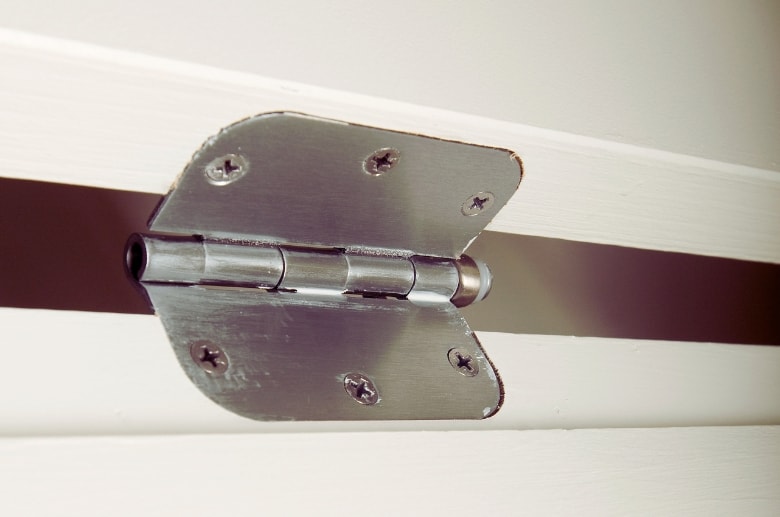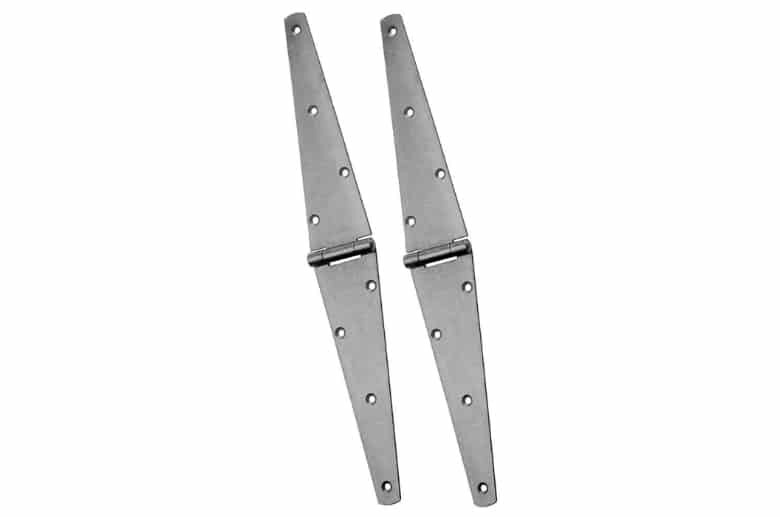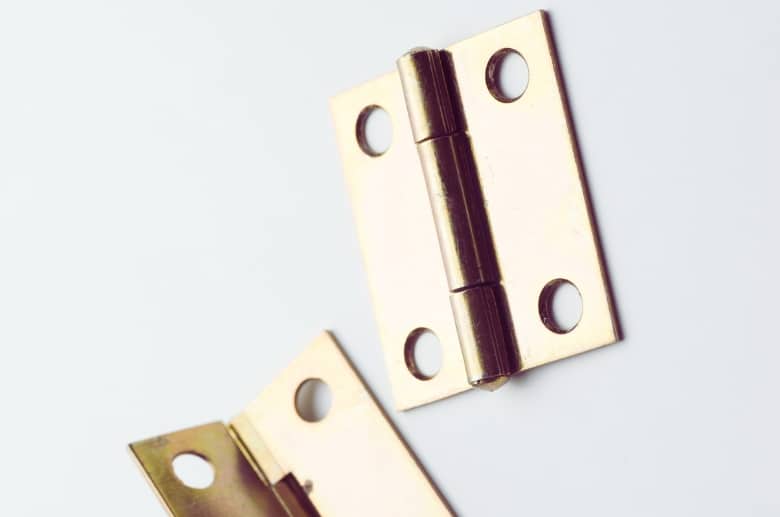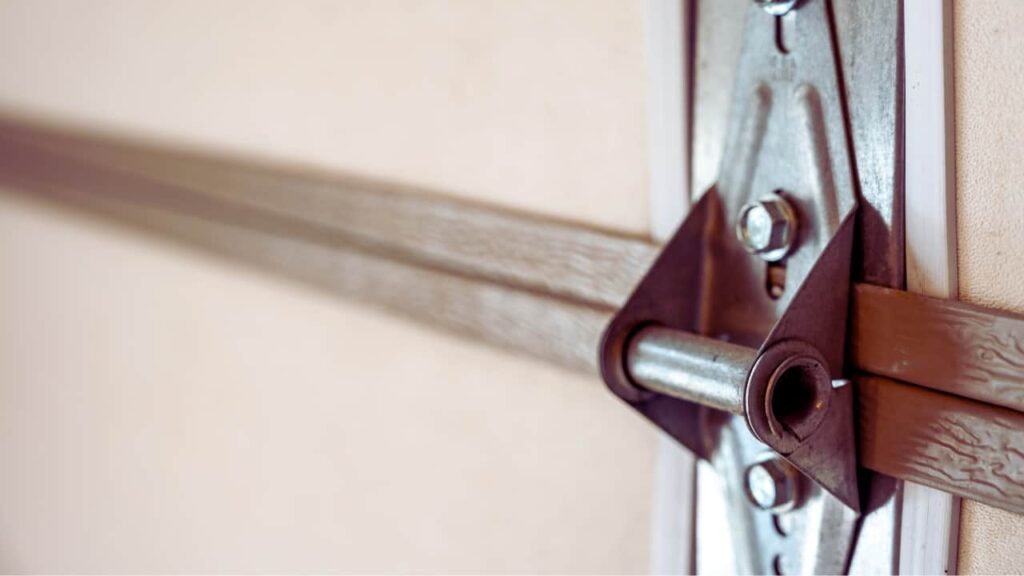Garage door hinges are of various types, styles, numbers, and gauges, confusing homeowners looking for one at their local hardware store. Using the wrong door hinge for your garage can render your garage door useless, forcing you to buy a new one or invite professionals to repair it.
So, to save you some time and money, we will talk about the different garage door hinge types and styles, a little about the cost, and we’ll throw in a few tips and FAQs at the end. This will ensure you’re well-informed about garage door hinges, helping you identify the right fit for your garage door.
What Are The 4 Styles of Hinge Called?
It’s important to know about the styles of door hinges so you can pick the style that suits your needs. In a typical hardware store, you will find four styles of door hinges.
Butt Hinges or Mortise Hinges

In a residential setting, butt hinges would be excellent since they are pleasing to the eyes. They’re made of durable steel and specifically designed to cater to heavier garage doors. Most homeowners find it convenient to use butt hinges since they can support significant weight.
The butt hinges are sturdy. They can handle the door’s weight (as it moves) without bending or breaking due to stress. It’s best to use two butt hinges to provide proper support.
You can conveniently find plain, decorative butt hinges at your local hardware store and choose the one that meets your needs. For a standard garage door, a butt hinge ranging from 6-12 gauge would work fine, typically handling a weight range of 150-250 pounds.
Flush Mount Hinges

Flush mount hinges are made of steel, brass, or aluminum. They are quite popular among homeowners because of their sleek and presentable look. Flush mount hinges are used to attach a door to its frame, allowing the door to swing back and forth without trouble. If you are eyeing a heavy-duty hinge, go for flush mount hinges, as they can last very long.
Their gauge ranges from 14 to 8. As the gauge goes up, the thickness increases, and the more weight it can handle. If you have a heavy industrial door, we’d recommend a 10-gauge hinge, whereas a 12 or 14-gauge hinge would do well with a residential garage door.
Strap Hinges

A strap hinge can secure your garage door pretty well, thanks to its long leaves. What makes strap hinges stand out is their long, slanted shape.
You would conveniently find a strap hinge gauge ranging from 14 to 8. As the thickness of the gauge goes up, the more weight it can shoulder. It’s important to go for one that can handle the weight and size of the garage door. Otherwise, it would bend or break.
A 12 gauge strap hinge can handle up to 250 pounds, and we would recommend a gauge of 10 or perhaps lower for heavier doors.
Case Hinges

Lastly, if you want to decorate your garage and make it look tidy, go for case hinges since they are appealing and attractive. Since case hinges have a unique shape, they are easily noticeable from afar. They also come in various options and can support the same weight as butt hinges.
Since they are made from steel, the durability of a case hinge is exemplary. Case hinge gauges range from 14 to 11. A case hinge of gauge 14 will conveniently handle a residential garage door weighing 150-200 pounds. Lower gauge hinges (such as an 11 gauge) will work fine for an industrial door.
Connect With A Garage Expert
Connect with local experts, Compare quotes, Get the best price.
What Are The Different Garage Door Hinge Types?
To ensure you don’t get confused on your next visit to the hardware store, let’s zoom over the different types of garage door hinges.
Residential Hinges
Residential hinges are usually made of durable steel that will support your door’s weight and provide a smooth transition upon opening and closing. A typical residential door would work flawlessly with a 14 gauge.
These hinges are easier to work with, meaning homeowners can install them without professional help. To install residential hinges:
- Take a screwdriver to unscrew the current hinges
- Attach residential hinges and secure them onto the top, middle and bottom hinges.
- Position them appropriately and match the holes in the frame.
- Lastly, fasten them with screws to complete the job.
Residential hinges are divided into 3 sub-categories:
- Top Hinges: You will find a top hinge at the top section of a residential garage door. When you open or close it, it travels with the garage door’s surface.
- Center Hinges: This component is placed at the center, and it ensures the garage door’s top and bottom work in synergy. Both parts should move independently so the door can conveniently travel as it goes up.
- Bottom Hinges: You’ve probably worked out where this part goes. Right? A bottom hinge must support and create stability for the lower half of your garage door.
Typically, you can find a decent branded door hinge ranging from $5 to $20. It largely depends on the material and size you go for, though. More importantly, a garage door will require several hinges, and once you add up the parts, it’ll spike your total cost.
Commercial Hinges
Commercial hinges are more heavy-duty and come in various sizes, shapes, and types. They are usually made of brass, steel, or aluminum, and this grants them better performance and extended life compared to other door hinges.
A typical commercial door would use an 11-gauge door hinge. Commercial hinges come in the following sub-types:
- Piano Hinges: Long in shape and narrow in size, these hinges work for vertical doors.
- Strap Hinges: Strap hinges work well on wooden garage doors; they are also used because they look attractive.
- Continuous Hinges: The longest in size out of the lot, these hinges provide extra durability and support.
- Butt Hinges: Perhaps the most common commercial hinges, this one provides a consistent, smooth transition for a typical commercial garage door.
Commercial hinges differ in many ways from residential hinges. They are larger in size (2-4 inches wide and 4-8 inches long), more expensive, and the design has stark differences.
Commercial hinges usually have additional features such as ball bearings and extra locks for safety. Whereas residential hinges may have multiple sections, and they are all connected by a hinge.
Plus, commercial hinges can hold more weight. They also require time-to-time maintenance owing to the wear & tear they go through. It is essential to change one before the garage door incurs permanent damage.
Truck Door Hinges

Truck door hinges work for a specific reason: to keep the components or the people inside safe.
Since trucks move around a lot, a typical wood door hinge or regular steel wouldn’t fit well. On the other hand, truck door hinges provide exceptional support to the door and are able to handle heavy weights and stress that the door may experience throughout the journey.
Moreover, truck doors are opened and closed more frequently than residential or commercial doors. Both residential and commercial garage door hinges are not designed for that many opening cycles. Truck door hinges, on the other hand, are not only designed for more opening cycles but are often coated with corrosion and wear-resistant materials.
Commonly, you would find three types of truck door hinges: Butt, continuous, and piano. Since we’ve mentioned them, we won’t hassle you with the explanation once again.
Typically, the material is the biggest factor separating commercial garage door hinges from truck door hinges. Commercial door hinges are commonly made from stainless steel, aluminum, or brass, while truck door hinges are usually made of steel to support heavy loads.
They also are differently sized, having a width and length of 1.5-6 inches and 2-10 inches (or more), respectively.
Comparison of Residential, Commercial & Truck Door Hinges:
Here’s a tabular comparison of the three main types of garage door hinges:
| Hinge Types | Price(in $) | Weight(in pounds) | Lifespan(in years) |
| Residential | 5-20 | >450 | 10-15 |
| Commercial | 5-50 | 300-2000 | 10-15 |
| Truck Door | 20-200 | 200-2000 | 10-15 |
How To Identify Garage Door Hinge Numbers and Placement?
You would see a number on its surface when inspecting a door hinge. A common misconception is that the number on the door hinge tells about its thickness.
However, the truth is the number on a door hinge tells about its positioning.
You would find the number 1 door hinge in the center of a garage door. A number 2 would fit between the 1st and 3rd panels, whereas a number 3 goes between the 3rd and the 4th panel of a typical garage door. The longer the garage door, the more hinges you will need.
Connect With A Garage Expert
Connect with local experts, Compare quotes, Get the best price.
Garage Door Gauge Sizes
Next up, you have the gauge size of the door hinge. As the gauge size goes up, so does the thickness. The steel on the door hinge carries the entire garage door up and down. So it would make sense for a heavy door to have a thick hinge.
Garage door hinges are either lightweight, thick, or heavy-duty. For a residential garage door, a gauge that ranges from 14-18 would work best. Thick hinges are needed to support garage doors that are frequently opened and closed.
However, thicker does not always mean better. You don’t have to strap the thickest gauge on your garage door if it’s not necessary. Remember, the job of a door hinge is to support a smooth transition of your garage door. If the hinge is too thick, it will restrict the movement of the garage door.
On the other hand, a door hinge with a thin gauge would collapse under the heavy door because it cannot handle so much weight. Therefore, it’s necessary to take some time to understand the weight of your door, its use, its durability, and the security you require for your garage door before purchasing garage door hinges.
How To Lubricate and Maintain Garage Door Hinges in 8 Easy Steps?

Do you hear an annoying squeak when you open or close the garage door? Chances are, your garage door hinges need to be lubricated. We have news for you if you’re avoiding this process to save money. Door hinges that are poorly lubricated will inevitably damage your garage door in the future. You would need to invite professionals, costing you more than you want.
A common problem that ails homeowners is the choice of lubricant they should use. While WD-40 seems your go-to option, we’d recommend you steer clear of it because it’s not long-lasting. WD-40 is also unsuitable for extreme temperatures and is more prone to dust and debris, increasing the chances of the door getting jammed.
The ideal way to do this is to use the lubricant designed to suit your garage door hinges. We recommend white lithium grease for steel hinges since it provides better adherence. If your hinges are made of plastic or nylon, use silicone spray lubricants.
Things You’ll Need
You will need to run down to the closest hardware store to stock up on the following items:
- safety glasses
- A mask
- A lubricant of your choice
- A piece of cloth.
Step-By-Step Guide on How to Lubricate and Maintain Garage Door Hinges
Did you get all the items to lubricate your garage door hinges? If so, then follow the steps below:
Safety first. Wear your gloves, mask, and safety glasses before you begin the lubrication process.
STEP 1: Close the garage door. Unless you can levitate and move through objects, you might want to bring down the hinges close to you.
STEP 2: Check the hinges. Before beginning the lubrication process, we want you to check the hinges from top to bottom. If they look damaged, consider replacing them. Don’t lubricate a door hinge that is taking its last breaths.
STEP 3: Clean the hinges. You didn’t forget to bring some clothes, right? Use it to clean the dirt and debris sitting on the door hinges. Don’t apply the lubricating agent directly! If you apply the agent directly, the debris will get in the way. This reduces the impact of the lubricating agent, and it’ll wear off sooner than you’d want it to.
STEP 4: Spray the lubricant. After shaking the bottle a little, start spraying. Coat the door hinge properly to ensure nothing is left unchecked. Cover all the sides down to every nook and cranny.
STEP 5: Open and close the door. Now that the lubricant is doing its job – providing support by moving the door. This will help to spread the agent evenly – reaching places you couldn’t.
STEP 6: Wipe it off. Use the cloth to wipe any excess lubricant from sitting on the door hinge. Anything extra will only attract uninvited debris and dirt.
STEP 7: Inspect the hinges. The final step is to inspect the door hinges. Move the door and pay attention to the noise as the hinges go up and down. If you hear any noise, you shouldn’t repeat the process.
If the process seems too much for you, you can call experts to do the job.
How Much Do Garage Door Hinge Types Cost?
There is no standard price for a garage door hinge, and it largely depends on the brand, size, gauge, number, and use. Generally, it would cost you somewhere between $50-150 pertaining to labor costs for installing garage door hinges.
For your convenience, though, we will try to narrow down the price ranges for door hinges that will be available at your local hardware store:
- Attractive door hinges range from $10-50 per hinge.
- Heavy-duty hinges cost you more since they can handle more wear and tear. A heavy-duty door hinge will cost anywhere from $15 to $200.
- Residential door hinges are cheaper and typically cost $5 to $20.
- Depending on the brand, gate hinges cost around $15 to $40.
- Torsion spring garage hinges cost $20 to $50 per hinge.
- Spring-loaded hinges typically go for $15 to $30.
The biggest factor that separates their price points is the brand you go for and the thickness of the door hinge. These prices are subject to fluctuation but will fall in a similar price bracket compared to your local hardware store.
Final Thoughts
Door hinges are an important part that makes up your garage door. First, we talked about the garage door hinge types and styles. Then we talked about what the numbers on the hinges represent and how the gauge standard is used to measure hinge thickness.
We also went through the entire lubrication process because this can help increase the lifespan of your door hinges. Lastly, we mentioned their price points to help you plan your budget.
However, it’s not always possible for homeowners to know about the different kinds of garage door hinges, their gauges, and their maintenance procedures. That is why the best option is to consult a professional to ensure your safety and the best possible garage door maintenance.
We hope this article assists you in finding the right door hinge for your garage door.
FAQs
Are Garage Door Hinges Universal?
There is no standard door hinge that can fit all types of doors. Designing a universal door hinge is impossible since several factors are at play.
How Long Do Garage Door Hinges Last?
A garage door hinge maintained properly will easily last anywhere from 5 to 15 years. However, this depends on the frequency of use and the chosen brand.
Can Broken Hinges Be Repaired?
Yes, but this depends on the extent of the damage that the hinge has incurred. A professional tool can repair a slight crack, and major damage calls for a new hinge. We don’t recommend repairing a severely damaged door hinge at all.




